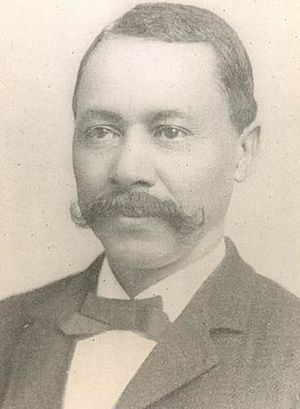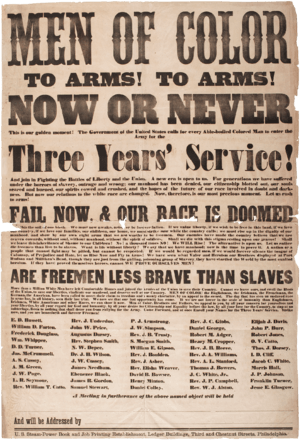Ebenezer Bassett facts for kids
Quick facts for kids
Ebenezer Bassett
|
|
|---|---|
 |
|
| United States Minister Resident to Haiti | |
| In office 1869–1877 |
|
| President | Ulysses S Grant |
| Preceded by | Gideon Hiram Hollister |
| Succeeded by | John Mercer Langston |
| Personal details | |
| Born | 16 October 1833 Derby, Connecticut, U.S. |
| Died | 13 November 1908 (aged 75) Brooklyn, New York, U.S. |
| Spouse | Eliza Park (m. 1855) |
| Children | 8 |
| Alma mater | Connecticut Normal School (now Central Connecticut State University) |
Ebenezer Don Carlos Bassett (born October 16, 1833 – died November 13, 1908) was an important American diplomat. He served as the United States Minister Resident to Haiti from 1869 to 1877. This made him the first African American diplomat from the U.S. and the fourth U.S. ambassador to Haiti. His mother was from the Pequot Native American tribe. Before becoming a diplomat, he was the principal of the Institute for Colored Youth in Philadelphia from 1857 to 1869.
Ebenezer Bassett became a leader among free African Americans after the American Civil War. He was a teacher, an abolitionist (someone who wanted to end slavery), and a civil rights activist. In 1869, he became the U.S. diplomatic envoy to Haiti. Haiti was known as the "Black Republic" in the Western Hemisphere because it was founded by formerly enslaved people. Bassett served there for eight years, even through civil wars and changes in government. Haiti was very important for shipping and as a place for naval ships to refuel in the Caribbean.
Contents
Early Life and Education
Ebenezer D. Bassett was born in Derby, Connecticut. His community had a strong history of owning property and running businesses. His family, the Bassetts, were especially well-known. Both his father, Eben Tobias, and his grandfather, Tobiah, were chosen as "Black Governor" in Connecticut. This was an unofficial but respected title within the Black community.
Bassett's parents made sure he received the best education. In 1853, he became the first Black student to attend the Connecticut Normal School. Today, this school is known as Central Connecticut State University. After graduating, Bassett taught school in New Haven. There, he became good friends with the famous abolitionist Frederick Douglass.
Educator and Activist
Soon, Bassett was offered a teaching job at a new all-Black high school in Philadelphia. This school was the Institute for Colored Youth (ICY). It later became Cheyney University of Pennsylvania, one of the first colleges for Black youth in the country. Bassett taught subjects like Latin, Greek, math, and science. After just one year, he became the principal. One of his students, John H. Smythe, also became a diplomat, serving in Liberia.
As the American Civil War began, Ebenezer Bassett became a leading voice in Philadelphia. He spoke out against slavery and worked for the freedom of nearly four million enslaved Black people. Bassett used the ICY as a place to help recruit Black men to join the Union Army. He invited many national civil rights leaders to speak. Just days after the Battle of Gettysburg, Bassett and other Black leaders organized a big event to recruit Black soldiers. Bassett had the honor of speaking right before Frederick Douglass.
Men of Color, to Arms! Now or Never! This is our golden moment. The Government of the United States calls for every able-bodied colored man to enter the army for the three years' service, and join in fighting the battles of liberty and the Union. A new era is open to us.
For generations we have suffered under the horrors of slavery, outrage, and wrong; our manhood has been denied, our citizenship blotted out, our souls seared and burned, our spirits cowed and crushed, and the hopes of the future of our race involved in doubts and darkness. But how the whole aspect of our relations to the white race is changed! Now, therefore, is our most precious moment. Let us rush to arms! Fail now, and our race is doomed on this soil of our birth.
Bassett was highly respected by educators in the North. He attended meetings and gave advice on education to abolitionists. In August 1865, he attended a meeting in New Haven, Connecticut, about educating freed slaves. Bassett spoke about the need for more African American teachers in the Southern states. He believed that freed people would trust and learn better from teachers who shared their background.
His work as an educator and activist made him a well-known figure in the abolitionist movement. When Ulysses S Grant became president, he looked for Black leaders like Bassett for important government jobs. Frederick Douglass recommended Bassett to the White House.
Diplomatic Career
When President Grant chose Bassett to be the Minister Resident to Haiti, it was a very important appointment. Bassett became one of the highest-ranking Black officials in the U.S. government. The U.S. did not use the title "Ambassador" until 1893. Haiti had gained its independence from France in 1804. However, the United States did not officially recognize Haiti until 1862. This was because Southern states did not want to recognize a country governed by former slaves. After the Union won the Civil War, the U.S. government wanted to improve its relationship with Haiti. They believed appointing Bassett was a significant step, not just because of his skills, but also for what his appointment symbolized.
When Bassett arrived in Port-au-Prince, Haiti was in the middle of a civil war. Even though he had no international experience, as a representative of the U.S., the Minister Resident was a very powerful person in Haiti. Bassett quickly learned that diplomacy involved many difficult situations. Soon after arriving, he wrote to Frederick Douglass that his duties were "not so onerous as delicate." He felt that "common sense and some little knowledge of law" would help him succeed.
Bassett handled many different situations. These included business claims from U.S. citizens, protecting diplomats and business agents, and helping citizens affected by hurricanes, fires, and various tropical diseases.
The Canal Crisis
One of the biggest challenges Bassett faced was protecting a political refugee named General Pierre Théoma Boisrond-Canal. General Canal was one of the leaders who helped remove the former President Sylvain Salnave from power in 1869. Later, during the rule of President Michel Domingue in the mid-1870s, Canal had retired. However, the new Haitian President was suspicious of anyone who might challenge him. He began to hunt down perceived threats, including Canal.
General Canal and two young relatives came to Bassett's home, asking for protection. Bassett agreed to protect them using his diplomatic immunity. This meant that as a diplomat, his home was considered foreign territory, and the Haitian government could not enter without his permission.
Canal stayed at Bassett's home, essentially held captive by the threat from the government, for over five months. After Canal was able to leave safely, Bassett sent a telegram to the U.S. Department of State. He told them that the crisis was over: "Refugees amicably embarked and soldiers withdrawn from around my premises yesterday."
Bassett stood up to both the U.S. Secretary of State and the harsh Domingue government in Haiti. By demanding fair treatment for an honorable Haitian citizen, Ebenezer Bassett served the best interests of both the United States and the people of Haiti.
When President Grant's time in office ended in 1877, Bassett resigned, which was a common practice when a new president took over. Despite any disagreements he might have had with the State Department, they recognized Bassett's excellent work.
Acting Secretary of State F.W. Seward wrote to Bassett, thanking him for his years of service:
I cannot allow this opportunity to pass without expressing to you the appreciation of the Department for the very satisfactory manner in which you have discharged your duties of the mission at Port-au-Prince during your term of office. This commendation of your services is the more especially merited because at various times your duties have been of such a delicate nature as to have required the exercise of much tact and discretion.
Later Life
After returning to the United States, Ebenezer Bassett worked for another ten years. He served as the Consul General for Haiti in New York City. Before he passed away in Brooklyn, New York, he lived in Philadelphia. His daughter, Charlotte, taught at the Institute for Colored Youth there. He is buried with his family at the Grove Street Cemetery in New Haven, Connecticut.
 | Sharif Bey |
 | Hale Woodruff |
 | Richmond Barthé |
 | Purvis Young |


